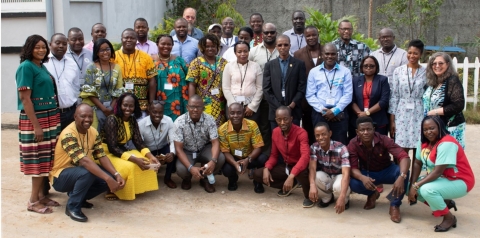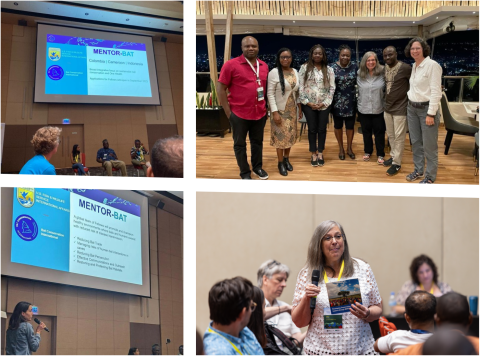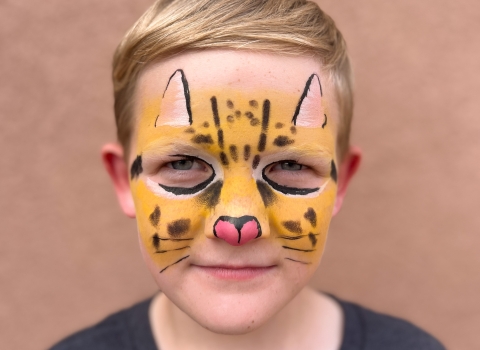“Bat-tastic” “Con-bat-ulations" “Running batty”: These are just a few of the bat-themed puns you might hear during a MENTOR-Bat meeting. But don’t let the levity fool you, the MENTOR-Bat team is working hard to launch this newest iteration of the MENTOR program.
Since 2008, the U.S. Fish and Wildlife Service's (Service) International Affairs program has supported seven MENTOR programs to promote conservation leadership and capacity development in Africa through mentoring and experiential learning. For each program, 8-11 Fellows are selected from a competitive applicant pool to form a transdisciplinary team: previous Fellows have been biologists, lecturers, lawyers, public administrators, urban planners, and communication experts. Long-term Mentors are also selected for the program and guide the Fellows through 18 months of combined academic and field-based training in problem solving, evidence-based conservation, strategic planning, team building, networking, and other conservation leadership skills. The learning partnership between Mentors and Fellows continues throughout both their careers.
Hailing from 11 countries, 61 Fellows have participated in the previous MENTOR programs:
- 2008 - MENTOR-BEAN (Bushmeat-Free East Africa Network) took place in Kenya, South Sudan, Tanzania, and Uganda to address illegal bushmeat trade.
- 2010 - MENTOR-FOREST (Forest Research Ecology and Stewardship Training) took place in Gabon and the Republic of Congo to develop and implement solutions for sustainable forest management and stewardship.
- 2014 - MENOR-PACE (Protecting Apes and Conserving Ecosystems) took place in Liberia and Sierra Leone to address conservation of the western chimpanzee and the Upper Guinean Forest.
- 2015 - MENTOR-Manatee took place in Cameroon, Democratic Republic of the Congo, and Gabon to address threats to the African manatee.
- 2016 - MENTOR-POP (Progress on Pangolins) took place in Cameroon, Democratic Republic of the Congo, Gabon, and Vietnam to champion the conservation of pangolins in Central Africa.
- 2019 - MENTOR-Fish took place in Gabon to address the conservation of inland fisheries in Gabon.
- 2020 - MENTOR-Bushmeat took place in Democratic Republic of the Congo, Equitorial Guinea, Gabon, and Republic of the Congo to address the prevalence of protected species in the urban commercial bushmeat trade.
Now, for the first time, MENTOR is going global.
MENTOR-Bat will bring together a team of 12 Fellows from Cameroon, Colombia, and Indonesia to use the One Health approach to champion healthy environments where bats and humans coexist with reduced risk of disease transmission. In partnership with Bat Conservation International, the Service is co-designing the program so that Fellows will holistically address the linkages between the health of bats, people, and the environment.
These linkages have immense implications for zoonotic disease spillover (when a disease transmits from animals to humans) and pandemic risk. Bats have co-evolved with many organisms that cause diseases, called pathogens, and are reservoir hosts to many of them without suffering the effects of the disease. Habitat degradation, human encroachment, climate change climate change
Climate change includes both global warming driven by human-induced emissions of greenhouse gases and the resulting large-scale shifts in weather patterns. Though there have been previous periods of climatic change, since the mid-20th century humans have had an unprecedented impact on Earth's climate system and caused change on a global scale.
Learn more about climate change , and other ecological disturbances can increase the bats’ stress. Stressed bats are more likely to shed, or release, pathogens into the environment, potentially infecting other animals. Ecological disturbances may also force stressed bats into closer contact with humans, which increases the risk for zoonotic disease spillover and ultimately the risk for a zoonotic disease outbreak or pandemic.
In broad terms, the greater the human disturbance to bats and their habitat, the greater the risk of zoonotic disease spillover to humans.
MENTOR-Bat Fellows will design and implement various projects to promote healthy, intact bat habitats and bat-human coexistence to reduce the risk for zoonotic disease spillover. These may include:
- The influence of habitat disturbance on the stress and health of bats and the impact this may have on increasing potential zoonotic disease spillover.
- The role that the consumption and trade of bats play in the risk of zoonotic disease transmission through direct human contact.
- How understanding of ecosystem services and economic value provided by bats influences habitat management policy and contributes to public perception of bats.
Launched at the end of July at the International Congress for Conservation Biology (ICCB) in Kigali, Rwanda, the first global MENTOR-Bat team workshop is expected to take place in Colombia in early 2023. A second workshop will be held in Indonesia halfway through the program for the Fellows to plan their bat conservation and One Health projects. Fellows will present their project outcomes at a MENTOR Forum in Cameroon in mid 2025.
Learn more about past MENTOR Fellows, Mentors, and programs in Developing Conservation Leadership through MENTOR
Read more about the impacts of the MENTOR program in Capacity and leadership development for wildlife conservation in sub-Saharan Africa: Assessment of a programme linking training and mentorship, published in Oryx.






